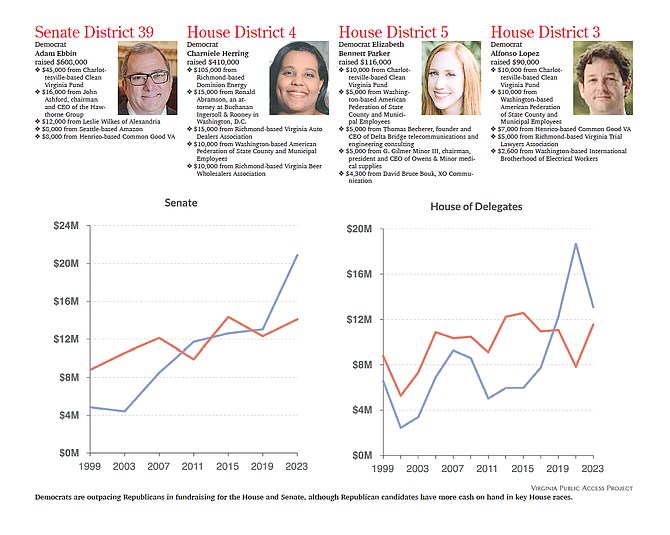The election in Alexandria this year is kind of a dud in terms of competition. But don't let that fool you because the race for campaign cash is hotter than ever.
According to campaign finance documents, candidates running for the four General Assembly seats in Alexandria have raised a total of $1.2 million — a staggering amount considering the candidates are either unopposed or in races that are not competitive. Add to that the $1.6 million retiring Senate Majority Leader Dick Saslaw raised this election cycle, and that's almost $3 million the Alexandria delegation is contributing this election cycle.
“The amount of money is fascinating, although I’m not sure what it says about our current state of democracy,” said Brian Moran, former Alexandria delegate who served as chairman of the House Democratic Caucus. “There’s a real financial war going on right now, and of course the governor is raising record amounts of money.”
At the top of the money pyramid in Alexandria is state Sen. Adam Ebbin, who is currently running for the newly created Senate District 39. Because he's chairman of the General Laws Committee and one of the more senior members, he is responsible for helping Democrats keep control of the chamber. During his time in the Senate, he's given $250,000 to the caucus. In the last election cycle, he gave $140,000 to the caucus to help candidates in competitive races.
"If a candidate is likely to help move the needle on getting a majority on either side, then the caucuses will come in and put in money either directly or indirectly," said former Republican Delegate David Ramadan, now at George Mason University's Schar School of Policy and Government. "We'll see quite a bit of that throughout the summer with a huge push toward the end of the summer or the fall."
Aside from money to the caucus, Ebbin also helps individual candidates in tight races. In the 2019 election cycle, Ebbin gave $30,000 to Democrat Amy Laufer who was hoping to unseat Sen. Bryce Reeves, a Republican from Spotsylvania. He also gave $9,000 to Democrat Debra Rodman in her campaign against Sen. Siobhan Dunnavant, a Republican from Henrico. Earlier this year, he gave $8,000 to Sen. Creigh Deeds of Charlottesville to help him defeat a challenger in the Democratic primary.
"That creates expectations for future legislative sessions," said Karen Hult, a political science professor at Virginia Tech. "People might be more open and willing to listen to other members and also to some of the advocates who have given money."
Ebbin does have a Republican challenger, although the race is not considered competitive. Republican Sophia Moshasha is the only Senate candidate on the ballot anywhere in Virginia who is 100 percent self-financed. Campaign finance records show she loaned her campaign $300 for setting up a website through GoDaddy and buying food from Asian Bistro for a campaign meeting.
"I think it's too easily overstated that money is somehow buying votes. We don't have very much direct evidence of that," said Hult. "But it opens doors and eases relationships. And in a part time legislature it's how a lot of legislators get information and knowledge and know who to call when they've got questions."
ALEXANDRIA'S HOUSE DELEGATION is also flush with cash even though only one candidate faces an independent candidate who hasn't raised any money so far. Del. Charniele Herring served as majority leader for the brief period that Democrats controlled the House, and she is now the chairwoman of the House Democratic Caucus. In this election cycle, she's raised almost a half a million dollars even though she has no opponent.
"As the chair, Charniele would have a high number she's expected to raise and contribute to the caucus," said Trevor Southerland, former executive director of the House Democratic Caucus. "Maybe she's going to run statewide in a few years. But if she wants to be majority leader again, she's going to have to stand up in front of the caucus and show what she did to help get that majority back."
This election cycle, Herring has given $50,000 to the House Democratic Caucus, making her one of the top donors and giving her a key voice in how the money is distributed later this year. Campaign finance records show she has contributed more than $1 million to the caucus during her time in office, putting her in league with some of the most influential members like former Speaker Eileen Filler-Corn and former Minority Leader David Toscano.
"When you become leader or chair or whip or campaign chair, you're expected to increase your giving," said Southerland. "The ones who have full time jobs are not always able to fundraise as much as people who make the legislature their full-time job."
